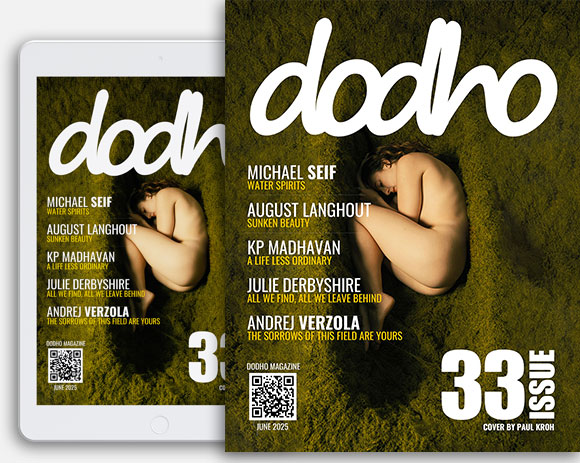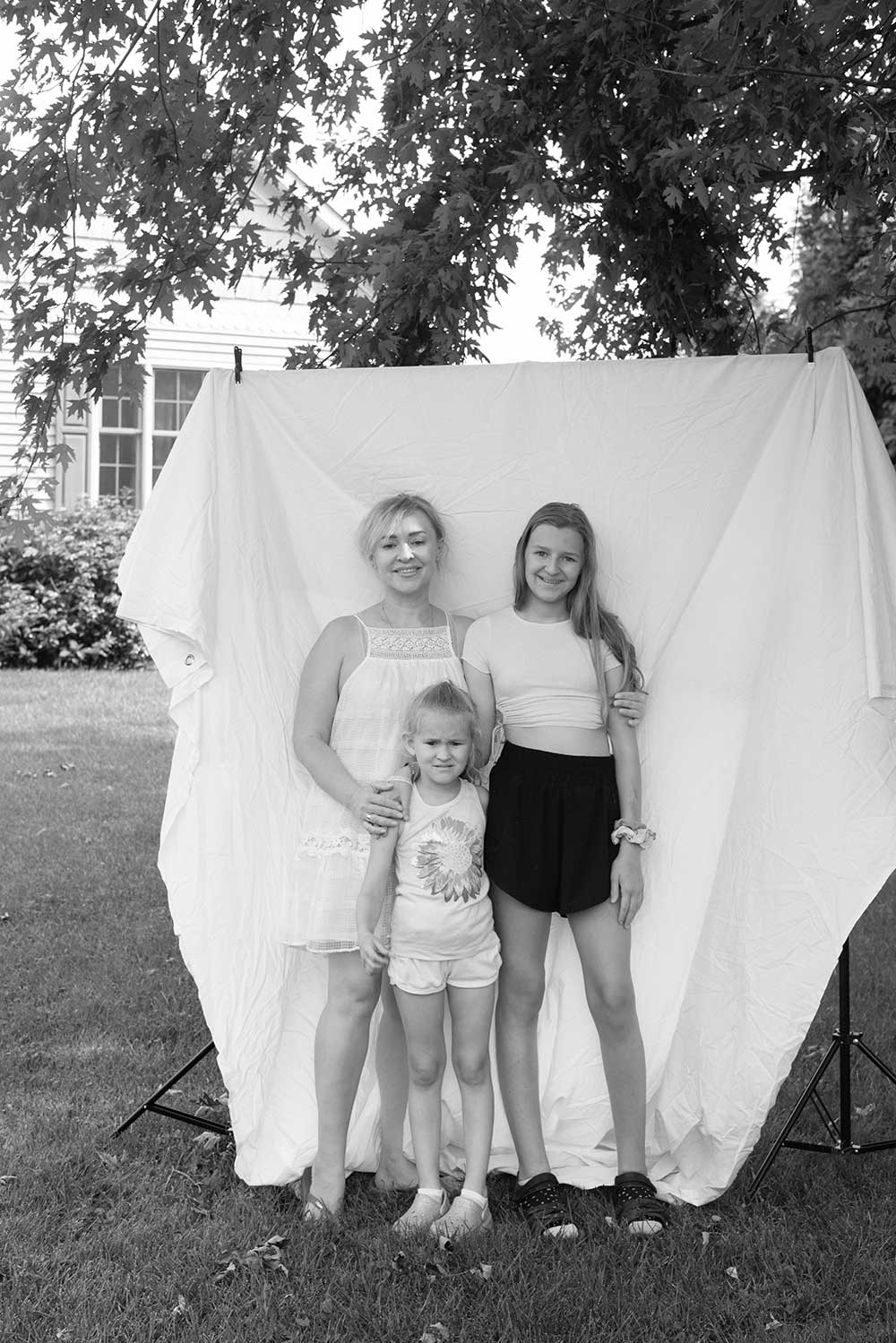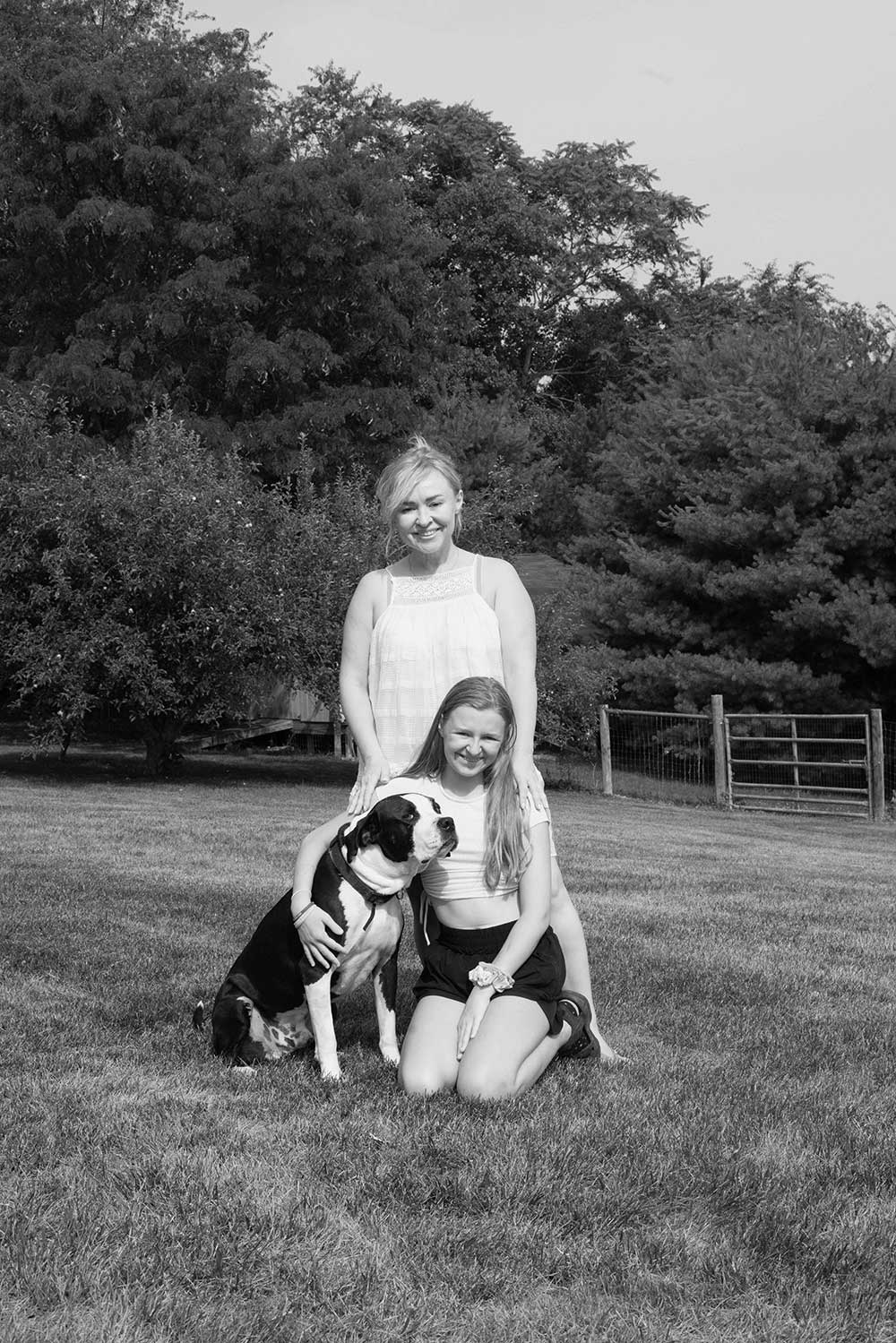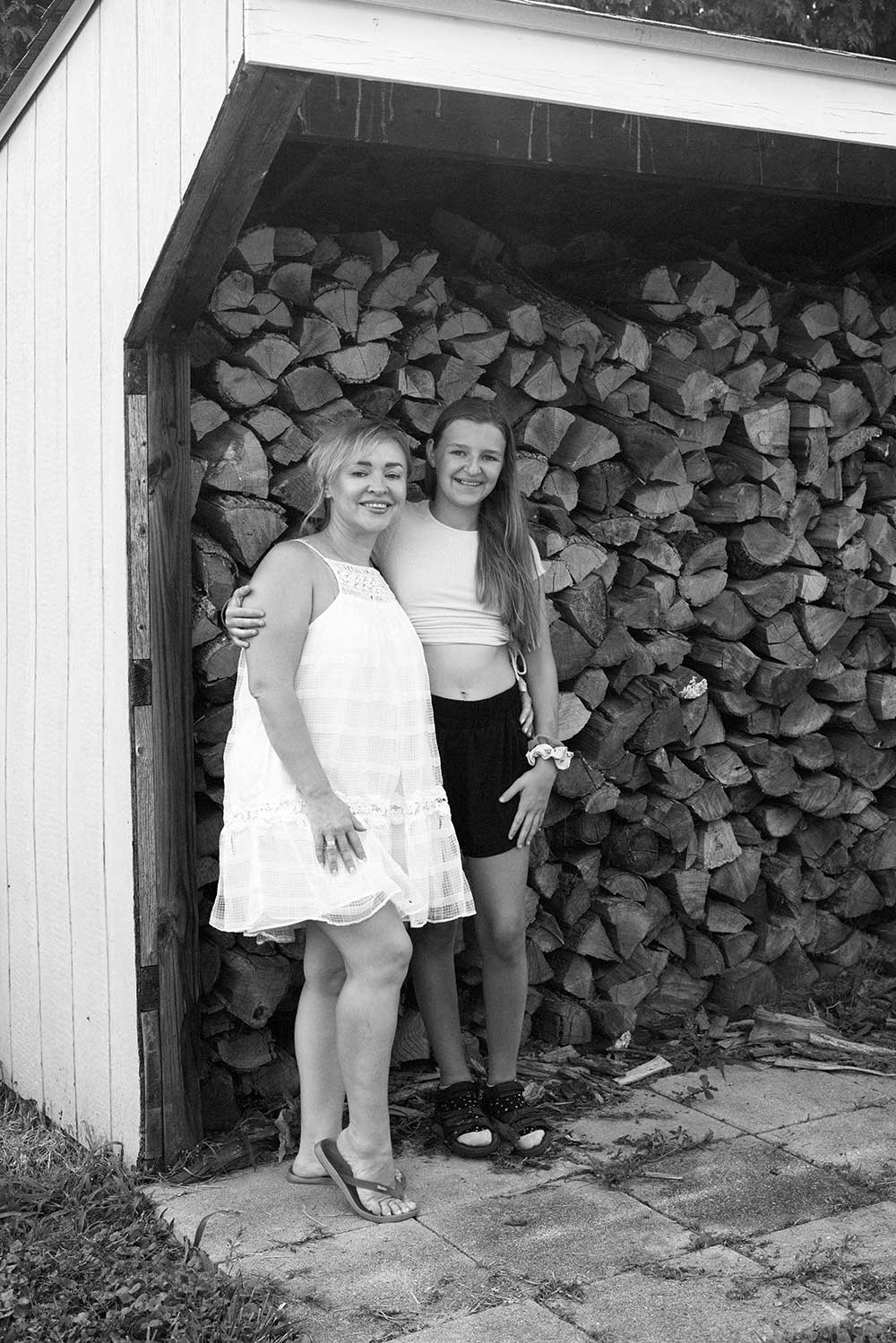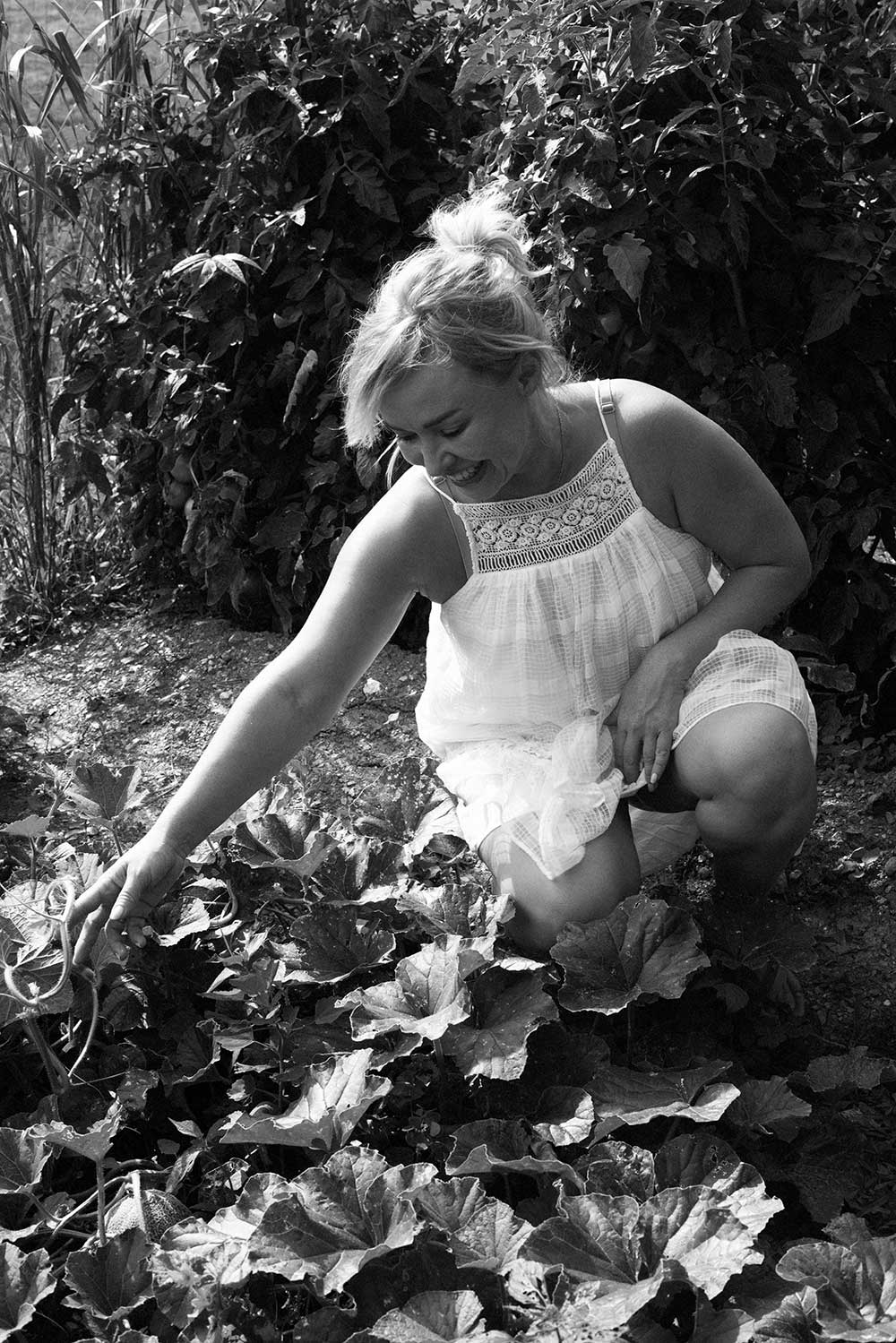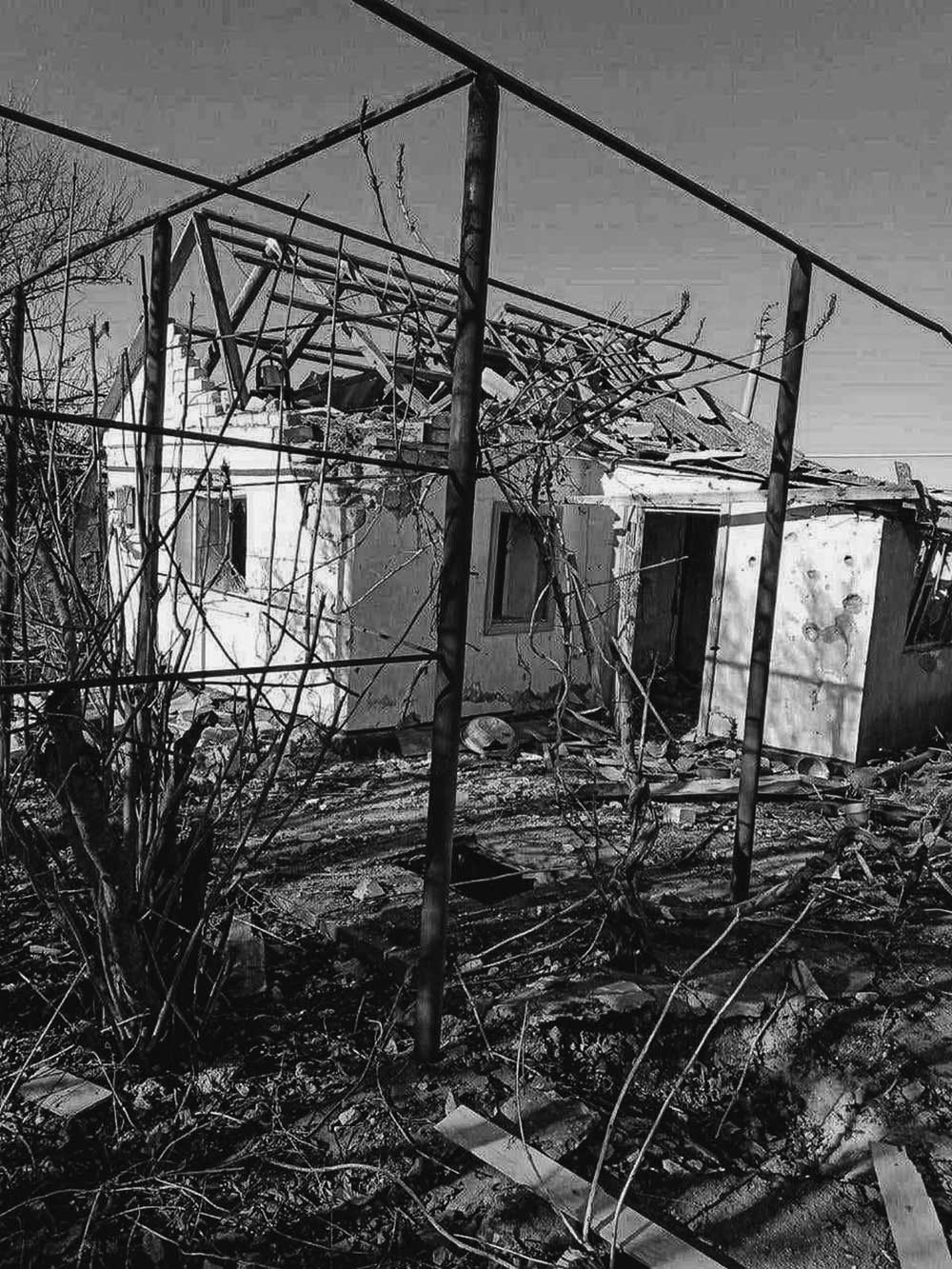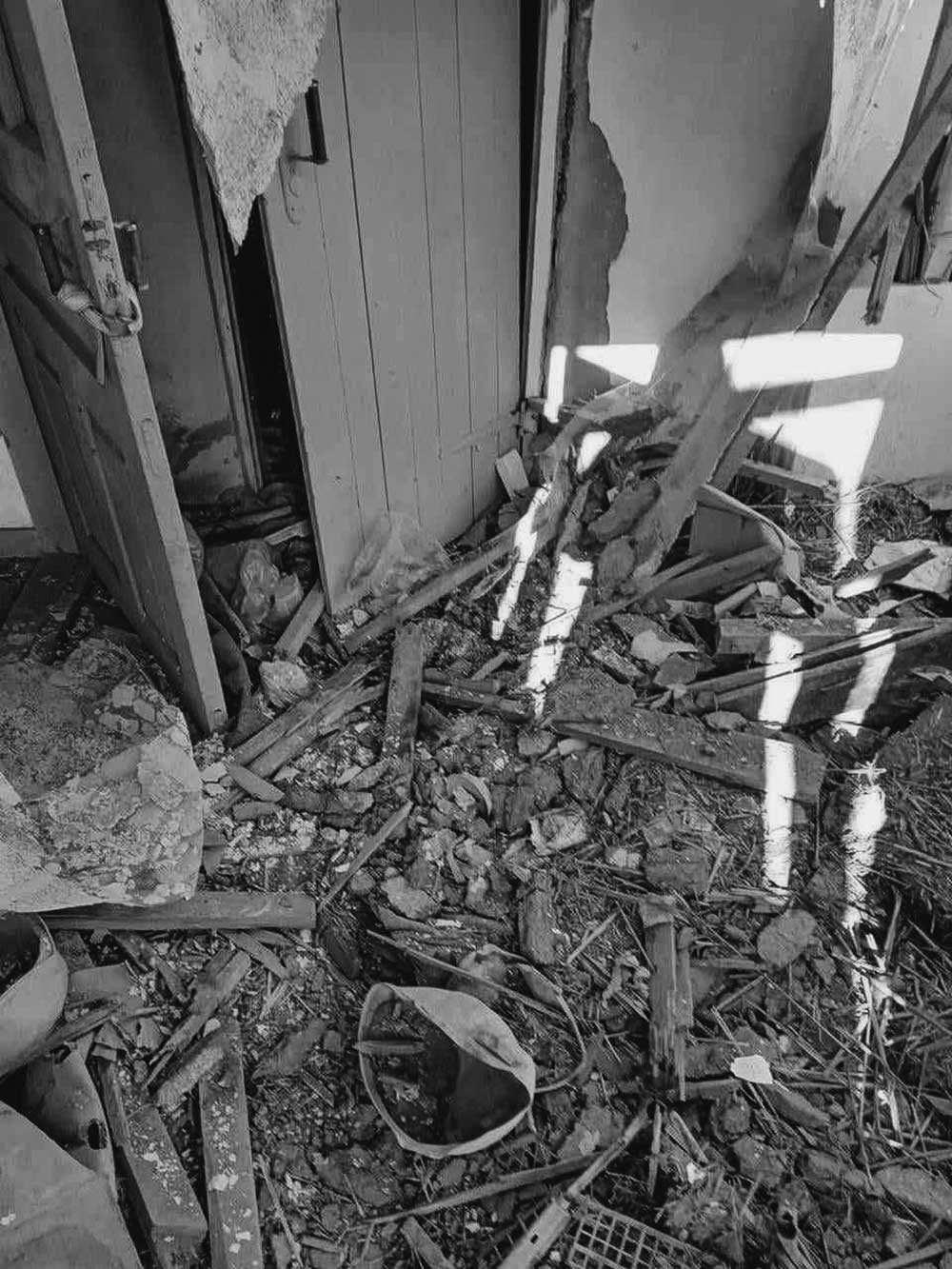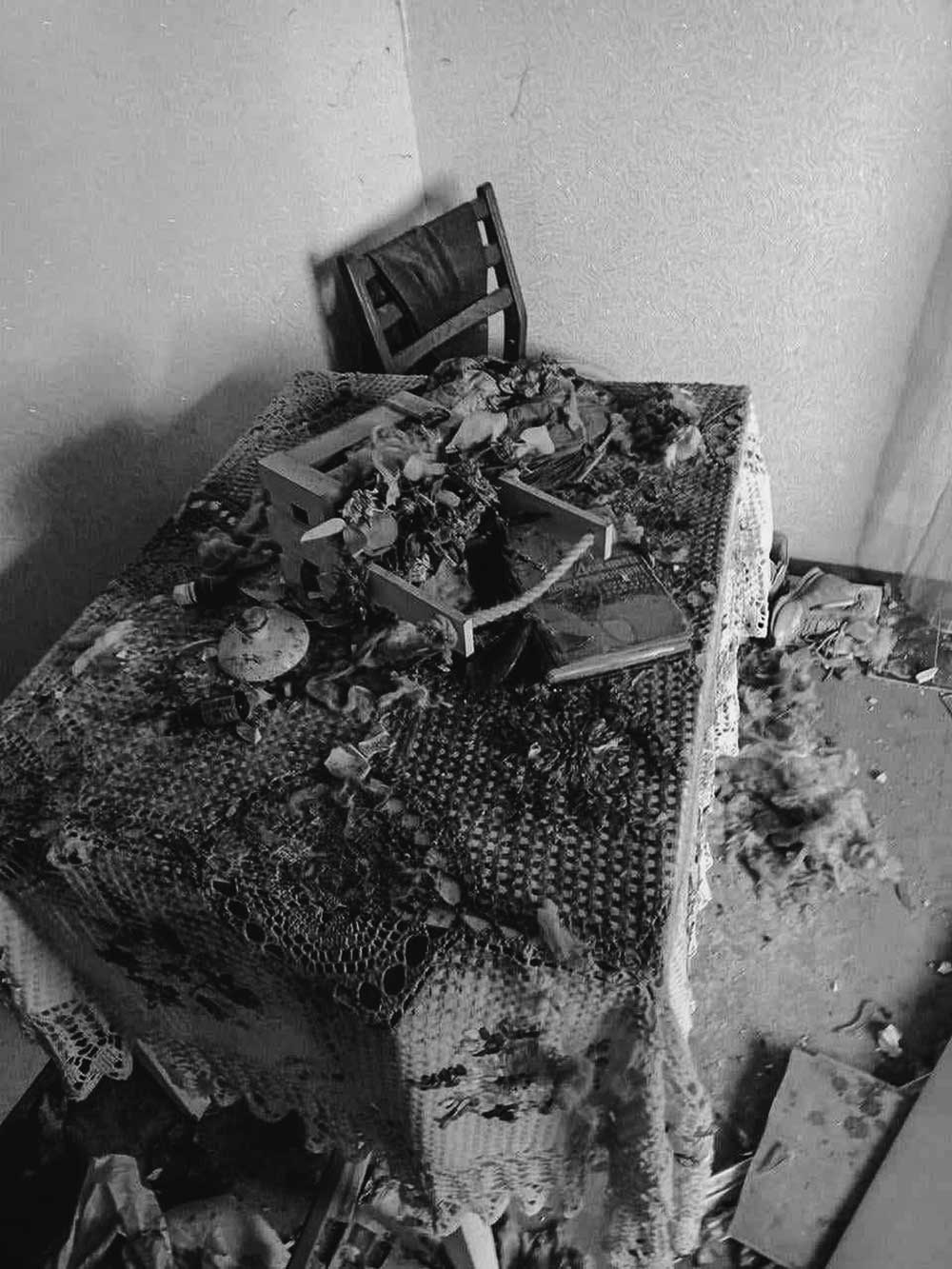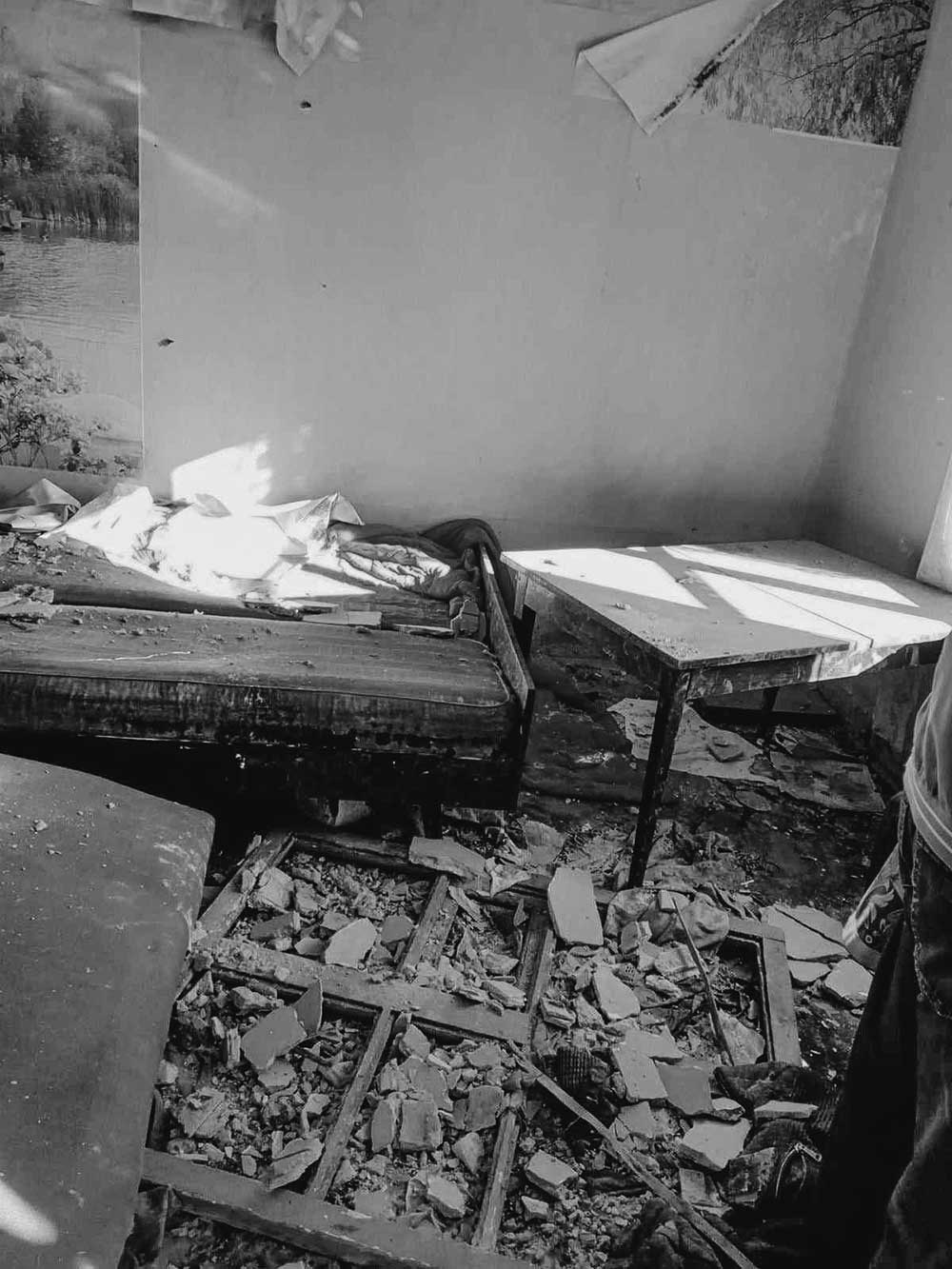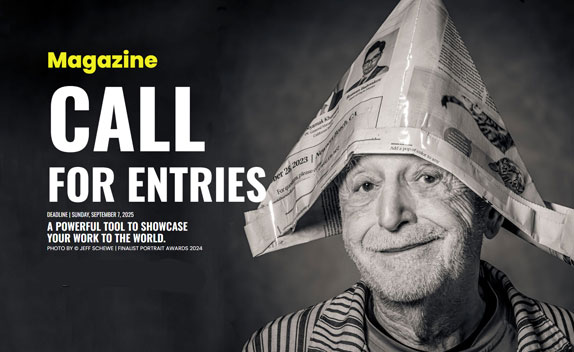OLGA, 4 600 miles from home – 41 y.o., Chief Financial Inspector, State Audit Service – Bucha District, Kyiv Region, Ukraine – Damascus, Maryland
«I was afraid that my children would die of cold»
– The story of a Ukrainian woman who fled the war-
Olga was born in Kherson. At the time of the full-scale invasion, she was at home with her family near Bucha, a town in the Kyiv region. There were heavy battles for several months.
Olga’s husband was one of the first to join the territorial defense forces. She told her personal story how she had to flee with her two daughters, live in separation from her husband and adapt to a new country.
On February 24th, my husband, children and I were at home, just 1.5 miles away from the infamous town of Bucha. My husband woke me up very early because he thought a brick had fallen on the roof of our house. When the ceiling shook, we both realized that terrible war had begun. I immediately called my relatives and close ones, and everyone was shouting in unison, «It’s the war.» On the first day, my husband decided to fight. I begged him, got on my knees and asked him to think about the family, but he said it was his duty as a Ukrainian. He had never served in the army, never held a weapon in his arms, but nevertheless, he went to join the territorial defense forces.
The enemy quickly occupied neighboring towns but didn’t reach us. Later, we found out it was because of the swampy terrain around us. The enemy tanks simply couldn’t pass through. Luckily, our home survived.
My husband insisted that my children and I should leave as soon as possible. The shelling was getting louder and the enemy was getting closer and closer. I hesitated, I didn’t want to leave my husband alone but he wouldn’t listen to me and started packing my luggage. Finally, we had two backpacks ready: mostly things for the girls and medicine. I took almost nothing for myself. Still, the bags seemed very heavy.
When I got into the car, I was literally tearing my hair out, crying loudly because I didn’t understand what would happen to my husband and if I would see him again. My mom and dad stayed in Ukraine. On the first day of the invasion, my dad was coming back home from work but couldn’t do it because all the roads were blocked and being shelled. He had to abandon the car in the woods and my husband met him and brought him to us. So I was able to say goodbye to my dad but I never saw my mom before leaving.
Relatives drove us to the border. The journey was very difficult due to enormous traffic jams. Our car broke down in Rivne region. They told us it would take a week to repair it. We didn’t have money or friends there to stay overnight. By chance, I found online a local church where they helped people like we were. Pastor gave us a room and provided free food. They fixed the car in just one day and we were able to continue our trip. However, the car broke down again and we had to stop in the middle of the woods.
Eventually, we reached Lviv somehow, and from there, we walked for two days to the Polish border on foot. It was -7 degrees Celsius (19°F). We were going very slowly. The girls were struggling, but I was impressed by their endurance; they never cried or complained throughout the trip. My elder daughter carried a huge backpack with our belongings and medicine on her shoulders and never said how difficult it was for her. Our legs were giving in from exhaustion and we practically fell from weakness and cold. But we kept walking. To stay alive.
Volunteers fed us in some places and people made campfires where it was possible to warm up a bit. When we had to pass through forested areas, the military people asked us to walk very quickly, almost run, because it was dangerous. My younger daughter, who was 4 years old at that time, fell to the ground and fell asleep from exhaustion and I picked her up like a little monkey and draged her along because we couldn’t stop.
Later, I got information that nearby, at another border, approximately at the same time – a little boy died. I don’t know if it was from hypothermia or another reason.
But we were constantly outside and I worried about the children. I remember when we decided to take a short rest and my kids fell asleep in my arms. A stranger approached us, put socks on the children’s feet without saying a word and disappeared.
Sophia (Olga’s elder daughter): My younger sister and I ran in circles to warm ourselves up. And when we walked through the woods at night, people lit fires and we put our feet into the fire to feel our toes which were numb from the cold. I didn’t even notice that our shoes were slightly burnt. But it didn’t matter; the main thing was to warm up. There were no toilets around so we had to find the way out.
Closer to the border, people helped us to carry our bags. It seemed like there was no end of this trip. We had been walking for 2 days already! There was a long queue, and by the way, there were hardly any men among us: mostly women and children. Everyone was pulling all the bags. My husband gave me a small silver family icon before we left, and I regret for this because I lost it while we were walking. It was so precious to me, but maybe it was meant to be.
People were organized into groups of 100 individuals. These groups took turns crossing the border. Due to this, even though we were practically at the customs checkpoint, we had to wait for another 6 hours until the other group was let through because it was their turn. I realized that if I didn’t move to the other group with my children, something terrible could happen to them due to exhaustion and cold. So I joined the other group and we were allowed through. Perhaps thanks to that, my children are alive.
On the Polish side of the border, there were also many people sleeping on the floor, under the radiators. My children also lay straight on the floor because they couldn’t walk any further. In Poland, we family friends met us and we quickly reached their home and finally had decent conditions. The children slept for at least a day after the journey. Due to extreme fatigue, we didn’t even want to eat.
Now, when I mention Poland to the children, they ask me not to talk about it because everything is associated with almost deadly exhaustion and cold. They don’t like to remember that difficult period. In Poland, we stayed for 3 days and we were warmly welcomed. They brought us a lot of clothes and toys. I had never taken someone else’s things before. I felt so embarrassed. I blushed intensely and when they gave us money, I couldn’t accept it, although I knew we could use a bit of money. I couldn’t get used to the fact that people were bringing us things. We, Ukrainian girls, were used to achieve everything ourselves and not ask anyone for anything.
Thanks to the help from the Poles, we continued our journey with two full suitcases. We had enough of everything. We headed to France, where we also had friends. In France, we lived for several months, and then the American program for Ukrainian refugees was launched. I found sponsors for us through the internet.
I communicated with them through Google Translate as I didn’t know English. Then we had a video call, and they officially invited us to join them. In the US, we were warmly welcomed: they provided us with accommodation, helped with food and we didn’t even have to buy anything; the house was fully furnished. We’ve been living here for a year and a month now. We receive a lot of support. Currently, during the summer holidays, the children attend the best camp in our area, and it’s all for free.
Once, I saw on the internet that Santa Claus service was available in our area. Animators dressed as fairy-tale characters could come and greet the children for the New Year. I thought it would be great to entertain the children a bit and wrote to the company. A family couple involved in this business responded to us. They wrote that they would come for free and give presents to the kids. In the end, they visited us with a huge box of surprises. Everything was beautifully packed, colorful. Since then, we have become friends with this family. They are very kind people. God sent them to us.
We think about our home every day. My grandmother and grandfather are still in Kherson – they are 84 years old. My brothers, sisters, aunts and uncles also live in Kherson. Once, a shell hit the roof of my grandparents’ house. Luckily, no one was in the room at that moment. Grandpa repaired the roof and replaced the windows himself.
However, the war had a profound impact on my grandmother – she had a stroke. It took away her ability to speak; she can no longer talk. Before the war, she was very energetic and hardworking. She always gave me important advices and now I miss her voice very much. I really miss them and wish to see them in this life once more. However, I don’t know how it will turn out. We understand that they are no longer young.
My second grandmother is from Kysylivka in Mykolaiv region. The village was under enemy occupation for a long time. Grandma remained alone in the village. She didn’t want to leave her beloved home under any circumstances. However, when a shell hit her house, volunteers evacuated her. She didn’t take anything with her: no documents, no clothes. Her house was completely destroyed. Almost the entire village was wiped off the face of the earth. Now, my grandma lives with relatives in the Cherkasy region and dreams of returning home. But how can she live there – there is nothing left. Her son – my uncle and her husband – my grandpa are buried in Mykolaiv region. She can’t visit the cemetery now because it’s all mined. My grandmothers and grandpa are children of the war; they remember hunger and World War II. And now, they have to live through such hardships again.
When we visited our grandmas in summer, we used to divide our time – we spend a half of each summer in Kherson and the remaining half in Mykolaiv region. I loved come back to the place where I grew up. The war has caused too much misery. Back in 2014, my mother’s brother was killed in the war; he was young and left behind three children. He was from Kherson. And last year, another relative was killed – torn to pieces.
I am glad that I brought my children to a safe place, although it is difficult and painful for me. My children still feel fear about the war, and sometimes, they ask me if there can be a war in the USA too. I try to reassure them. My daughters are gradually settling into life here. Sophia speaks English well, and the younger one, Nicole, at her 5 years, already speaks it fluently too. Nicole sometimes finds it easier to express her thoughts in English.
People ask me whether it’s worth going to the USA if you have doubts, and I must answer – nobody else will understand this for you. In any case, to understand if this is your country, you need to come here first and try to live here.


